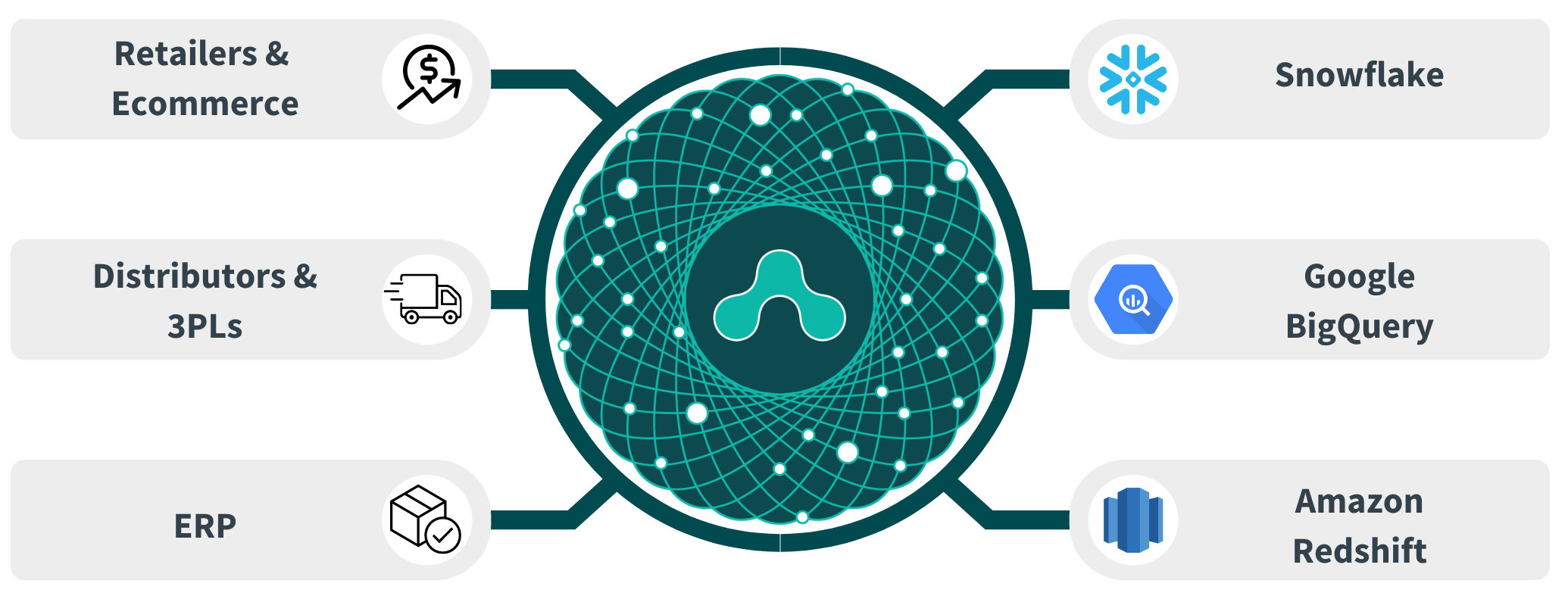Ingest & normalize retailer data to create a single source of truth

Integrate Retail POS data into Snowflake, BigQuery, Redshift or other data warehouses
Modern consumer products brands must connect with dozens of partners — retail, ecommerce, distributors and supply chain partners to get a complete picture of their business. Each one provides data in a different portal and format, creating a massive amount of manual work for IT, engineering and analytics teams. Alloy.ai lets CPGs bring connect, ingest and normalize data from 100s of retailer portals, distributors and your ERP into Snowflake, Google BigQuery, Amazon Redshift and other data warehouses.
Benefits of Using Alloy.ai for Data Integration
- Pre-built connectors to 100s of retailers and partners - Pipe in sell-through and inventory data from all of your retail, ecommerce and supply chain partners directly into your data warehouse or data late to help you create a single source of truth for partner data.
- A data pipeline at enterprise-scale - Alloy.ai manages the data pipeline for some of the largest most complex consumer brands in the world. Alloy.ai supports daily, weekly, monthly data as well as dozens of retail calendars. Whether you're selling 100 SKUs or 100,000 — whether you're selling through 1 retailer or 100 — Alloy.ai scales to meet your complexity.
- Supporting all the ways partners share data - Retailers share data in different ways — API, EDI, portals and even forwarded files. However your partners share data Alloy.ai has you covered with support for many different types of EDI files; reliable connectivity to retailer APIs; and a thorough understanding of retailer portal data availability, data size limits, reporting options, available metrics and attributes, restatement windows, error recovery, and historical backfilling.
- Improve your sell-through analytics with a complete view of your partners in one place - Use Alloy.ai's analytics or easily bring this data into your Power BI, Tableau, ThoughtSpot or your analytics application of choice to ensure your teams are always making decisions based on the latest, most accurate data.
- Automatically normalize data by time, currency, units of measure, location and product - Other solutions may normalize a handful of retailers of The normalization layer of the Alloy.ai data platform automatically translates disparate data sources and types into a single, unified representation of your business.
- Alloy.ai acts as an extension of your data engineering team- The Alloy.ai engineering team has is highly experienced managing CPG data and helping consumer brands move POS data into their data warehouses and lakes to power their analytics, planning and other business decisions. We're here to help you solve and strategize how to connect to your partners and the data sources you need to get a complete picture of your business.
- Always up-to-date - The instant new data is available, your data share will update with all of your partner data — fully normalized, at any scale.
- Star schema data model makes it easy to query cross-retailer - Our data model makes it easy to get started and easy to scale. All products and locations are in their own database tables, with time-series data provided in a separate table, with all data normalized for cross-retailer querying.
Questions CPG brands can answer with the Alloy.ai data platform
- How can I bring POS sell-through data into Snowflake, BigQuery, Redshift or other data warehouses and data lakes?
- How can I save time by automating data normalization?
- How can I automate getting the most recent sales and inventory data from all of my retail partners?
- As a CPG brand how can I get a hollistic picture of my business, rather than a hodgepodge of disconnected systems?

Bosch’s sales strategy with POS data
Explore Bosch’s best practices for building a successful sales strategy with POS data — gathered from across ecommerce and retail customers.

Matthew Bergum, Country Business Director
Trusted by 100s of Consumer Brands

Instant sales and inventory insights at your fingertips.
Book a Demo
Frequently Asked Questions
How does Alloy.ai facilitate the integration of POS data from multiple retail partners?
Alloy.ai connects with over 350 pre-built data sources, including retailers, e-commerce platforms, distributors, 3PLs, and ERPs. It automates data collection regardless of format—be it flat files, APIs, EDI, or Excel spreadsheets—ensuring seamless integration of both external partner data and internal systems.
What types of data sources and formats does Alloy.ai support for data integration?
Alloy.ai supports various data-sharing methods employed by retailers, including APIs, EDI files, portal downloads, and forwarded files. This versatility ensures that brands can integrate data regardless of the format or method used by their partners, accommodating the diverse data-sharing practices across the retail industry.
How does Alloy.ai handle the complexity and scale of data integration for large consumer goods brands?
Alloy.ai manages data pipelines at an enterprise scale, supporting daily, weekly, and monthly data updates across multiple retail calendars. It efficiently handles varying complexities, whether a brand is selling 100 SKUs through a single retailer or 100,000 SKUs through numerous retailers, ensuring scalability and reliability in data integration processes.